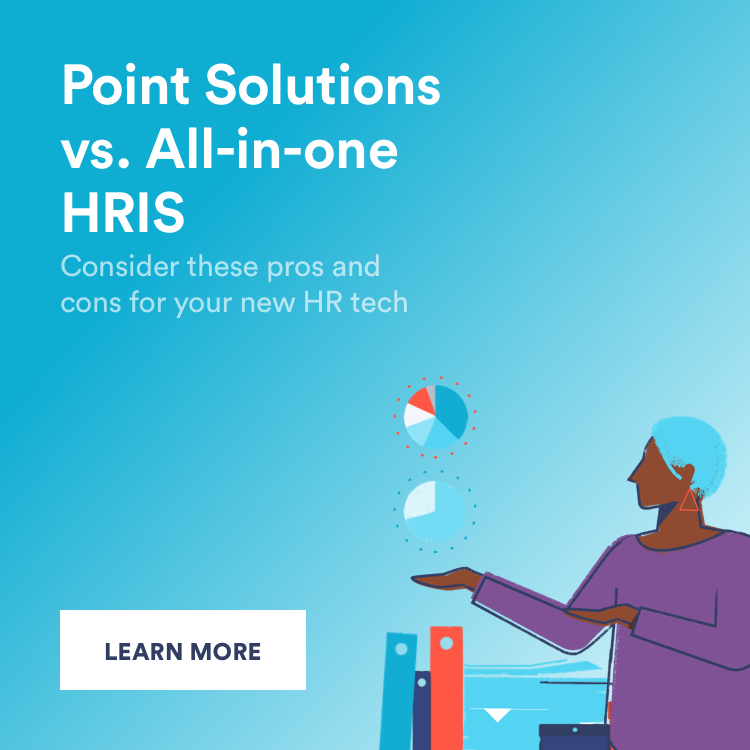If your company doesn’t need a full- or part-time HR professional on staff, you don’t have to run the risk of doing without expert advice. Outsourcing HR might be the right fit for any business. But how do you know? This article will help you.

Here's what you need to know about should your company have an HR professional on-staff or outsource?:
-
Without a highly skilled professional, you may be denying employees their rights under a variety of laws and putting your organization at risk.
-
If you don’t need a full-time staffer, you may be able to find someone willing to work part-time to manage your HR processes.
-
Even if you don’t think you have an HR Department, your business does. Someone is managing these functions.
Many SMBs go back and forth on the question of whether to hire a dedicated HR professional. It would be helpful to have someone available to manage HR tasks and be there with answers when problems or questions arise. But is it worth the investment? Then there are the options, do we need someone full- or part-time, or should we outsource the function altogether?
These are important questions, but they’re not the beginning of the process. The first question isn’t whether or not to hire or outsource but whether keeping the HR functions in-house is cost-effective.
Someone must be HR
Even if you don’t think you have an HR Department, your business does. Someone is managing these functions. The questions are whether or not they are qualified and how much time they are spending ignoring other tasks.
Start with qualifications
Who is performing these duties in your business today? Someone must be managing the most rote tasks, like payroll and benefits processing, and the most complex, like recruitment, discipline, and compliance. Are they qualified and current with laws and regulations? Do they have the time to make sure they are?
Next, factor in time. What other job duties are they neglecting to manage these functions: is it cost-effective? For example: If the business owner is managing HR, there’s a good chance other, more profit-generating, tasks are being set aside.
HR is a complex function. When deciding how to manage HR, evaluate some of the main issues to weigh your options.
If you’re satisfied the person currently managing HR duties is qualified and has the time, your business probably doesn’t need to add another role. If you’re not confident of their skill set, or other more high-value tasks are being abandoned, it’s time to consider your options.
Outsourcing or in-house
HR is a complex function. When deciding how to manage HR, evaluate some of the main issues to weigh your options. Examine where you’re investing wisely and where you may be putting your organization in harm’s way.
Qualifications
Is the person managing HR duties qualified to do the job? From the beginning of the recruitment process through separation, there is a myriad of laws that apply to how you treat applicants and employees. Talent management, for instance, is fraught with risk.
If your company representative isn’t fluent in federal, state, and local law, you could be at high risk for a complaint from an individual or an agency or even be subject to a lawsuit.
This type of short-term saving could cost you dearly if the person performing HR tasks is unqualified. Even if your company is in the right, the EEOC estimates it costs business, on average, $125,000 to defend against a charge of discrimination. An out-of-court settlement could cost between $40,000 and $50,000.
At every point of connection is an area of risk: from the way you recruit and interview to how you manage wages, performance tracking, leave requests, and promotions; to how you separate from employees. Without a properly trained professional, your risk could increase exponentially. If your current in-house talent isn’t fully qualified, it may be time to outsource.
Recruitment
Recruitment is the most-frequent task non-HR professionals perform. Managers often begin the interview process and determine who to hire. This could be an occasional duty or one that is ongoing. Do these managers have the expertise to ask interview questions that uncover skills and weaknesses? Do they know which questions they should never ask?
When they determine who to hire, are they making a decision based on unconscious bias? Is there a possibility of disparate impact in the process they may or may not be aware of? If hiring managers aren’t fully trained in all these areas, outside assistance may mean better hires, faster results, and lower turnover.
Talent management
How often do employees come to you, or their manager, with questions best posed to a qualified HR professional? Business owners are often at the mercy of internet search engines to find (hopefully) the correct answer. If they get it wrong, there may be fallout.
In some organizations, leadership may be unaware of questions being posed to supervisors and whether or not the correct response is being given. This can lead to:
- Low employee engagement
- Diminished productivity
- Turnover
- Risk of a formal complaint
Performance evaluations are another key role for HR professionals. They may not be rating employees, in general, supervisors do. HR is responsible for ensuring evaluations are fair and equitable and completed on time.
Leave of absence requests need to be administered promptly and properly. Managing leave requests, light duty, or accommodation requests requires a high level of fluency in the law and employee rights. Employees may have protected leave under the ADA or FMLA or because of a long- or short-term disability.
Without a highly skilled professional, you may be denying employees their rights under a variety of laws and putting your organization at risk.
Policy management
You may have created your own policy manual and employee handbook, or perhaps you downloaded them from the internet. Now that you have them, someone must be responsible for ensuring policies are being evenly enforced, adhered to, and kept current.
Disparate treatment is a form of discrimination. If one supervisor in your organization allows employee tardiness while another disciplines staff members, you may be at risk. An HR professional can not only advise managers on policy; they can spot patterns where disparate treatment may be occurring.
Those who are qualified are best to handle the high-risk task of terminating employees. If hiring managers terminate staff without training or guidance from an HR professional, your company may be at risk.
Those who are qualified are best to handle the high-risk task of terminating employees. If hiring managers terminate staff without training or guidance from an HR professional, your company may be at risk. When an employee is involuntarily discharged (fired) incorrectly, discrimination, retaliation, or other claims can be made. Even employees that resign may pose a threat.
In-house or outsource
If you’ve determined managing HR on your own isn’t worth the time or the risk, it may be time to weigh the cost versus the benefit of hiring in-house or outsourcing.
Most SMBs find that an HR Generalist is a good fit for their business. These staff members are well-versed in all aspects of the HR function:
- Recruitment
- Talent management
- Compliance
- Payroll and benefits practices, etc.
This may be the first dedicated HR professional most companies hire.
The cost of an HR Generalist in a large market like Chicago averages about $65,000 per year. This is salary alone and doesn’t include benefits like healthcare coverage. Add these in, and your costs could be an additional 30% or more of the annual salary.
If you don’t need a full-time staffer, you may be able to find someone willing to work part-time to manage your HR processes. In either case, look for a professional with sterling references. You’ll want them to verify they stay current with all employment laws and regulations in your market.
Outsourcing may be the best option if the job isn’t full- or part-time, but you still need expertise. Leveraging existing vendors, like your payroll processor or PEO, or working with a new contractor, you may find outsourcing—having access to HR on demand—is the right choice for your organization.
Are you outsourcing already?
Many companies outsourced payroll as the first externally contracted HR task. It takes a huge burden off businesses. In addition to the time drain of running payroll every cycle, companies rely on trained professionals to stay abreast of payroll tax laws and changes. The vendor accurately and on-time files taxes to all the appropriate agencies.
Employee questions and concerns are first taken to the vendor, often resolved without the businesses’ input. Most payroll providers will even help employees complete their state and federal tax forms.
Payroll and benefits administration are the best starting point
Outsourcing payroll was a huge first step for businesses to get HR tasks off their plates and assigned to the most qualified. The amount of time saved alone is worth the cost of outsourcing for most organizations.
The next step for many SMBs was outsourcing benefits administration, creating a substantial time drain for businesses due to:
- New hire enrollment
- Enrollment changes
- Annual enrollment
Outsourcing benefits not only took the administrative tasks off the desks of otherwise busy workers but also put the function into the hands of dedicated professionals who manage enrollment seamlessly.
These vendors are trained experts who help employees navigate their coverage beyond enrollment. From enrollment decisions to questions about benefits and coverage, many vendors offer staff members access 24/7. They are even available to resolve disputes. With that in mind, it’s not hard to understand why most companies quickly realized the advantage of outsourcing benefits administration.
Many SMBs have found the benefit of outsourcing some of their HR functions. Others have yet to try outsourcing payroll and/or benefits processing. It’s worthwhile to investigate whether an outside consultant is the right fit for all your HR needs.
Deciding between in-house or outsourcing comes down to your needs
These are well-trained professionals who consistently update their knowledge base and expertise. They can advise company leadership on the smallest of issues to the most complex. Often, they can be a first step to resolving a problem before lawyers get involved.
Some payroll or benefits providers offer additional services at a nominal fee, like access to HR consultants. They may provide expertise on a pay-per-use basis: others may charge a monthly rate.
Outsourcing is a best practice for businesses that only need a trained professional occasionally or those who need one routinely but not enough to justify adding staff. There are plans and options available for any sized organization.
If a company doesn’t need an HR professional on staff, they don’t have to run the risk of doing without expert advice. Outsourcing HR might be the right fit for any business.







